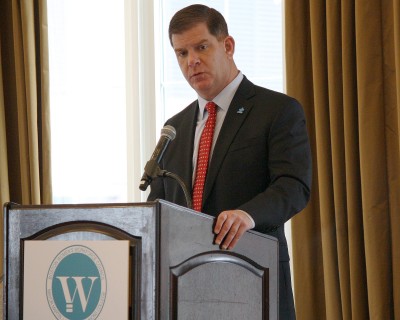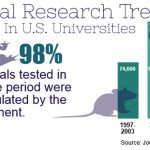
Boston Mayor Martin Walsh attended the City’s first Best Practices Conference Tuesday at the Omni Parker House to discuss wage equality in the workplace.
Hosted with Simmons College on Equal Pay Day, the conference celebrated Walsh’s 100% Talent Compact, a voluntary agreement in which businesses pledge to take measurable steps to eliminate the wage gap between men and women and to report their progress anonymously every two years, according to a Tuesday press release.
“The mayor of Boston is introducing a paradigm shift. It is a shift in how we look at the wage gap,” said Evelyn Murphy, former Massachusetts lieutenant governor and president of the WAGE Project. “After 50 years, we see that legislation is not enough, and the mayor of Boston is saying we need to collaborate with employers.”
Thirty employers have taken the pledge, Murphy said. The Boston Women’s Workforce Council, of which she is a member, also provided findings from businesses that signed the compact last year.
Approximately 175 people attended the conference, including representatives from companies such as Staples, Gap and MassMutual, as well as the CEOs of Vertex Pharmaceuticals and Putnam Investments.
Leaders of the conference stressed the impacts the mayor’s initiatives are making for women in the workplace, specifically focusing on the redefinition of the wage gap as a business issue, rather than a legislative issue.
Walsh shared statistics showing the significant presence of women in the workforce to prove the importance of equal representation and pay of women in the Commonwealth.
“During my transition as mayor, one of the first things I noticed was that we need to have more support for women living in the city of Boston. Women make up the majority of the city — 52 percent,” Walsh said. “The majority of those women are women of color, 54 percent, but women are underrepresented in leadership everywhere throughout the city of Boston.”
Panel members touched on how equal pay affects all members of society, not only women in the workforce.
Massachusetts Treasurer Deborah Goldberg, who served as the mediator of the panel, said equal pay is an issue that affects men, women, businesses and the economy as a whole.
“This is not a women’s issue … If you are a brother, a son or a father, this is your issue. It’s not just an issue for women. It is a family and an economic issue,” she said. “You have to recognize that not only is it an economic issue that supports the economic growth of our state, but it gives you a competitive edge in the marketplace.”
Walsh said equal pay and treatment of women in Boston is not only helpful, but also economically beneficial to the city as a whole.
“We know the strength of our city depends on making sure women get treated as equal and have economic security. That’s something that we need to do. It’s the right thing to do. It is the economically smart thing to do in our city,” Walsh said. “When women are paid equally, companies make more revenue, and that’s a fact. Look at the data. The data says it.”
The panel also touched on ways employers and companies participating in the 100% Talent Compact are working toward the goal of pay equity. Murphy acknowledged how attentive these companies have been toward the women working for them.
“What you see is that companies that are watching this closely, and it’s companies who sign on want to do the right thing and are therefore, doing this Internet pay review,” she said. “But that’s one thing, you see a vigilance from the companies that are committing.”
Murphy said many businesses that dedicate themselves to reaching pay equity also commit to a more equal and fair hiring process for women.
“You also see companies who are saying, we have to get wage equity right from day one, and that means the hiring process,” she said. “We have got to make sure that in the hiring process, we hire in a way that is equal and fair to women.”
Christina Knowles, the executive director of the Boston Women’s Workforce Council, said the council has received positive feedback from businesses that implement strategies for equal pay and treatment.
“Many signatories indicated that they have in fact seen improvements and positive changes in their companies,” she said. “These improvements, we were told, were especially noticeable with regards to employee morale, retention rates, having more women in the top levels of management and, in fact, seeing a better gender equity in their wages.”




